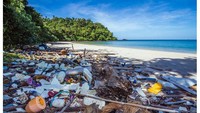A sea of voices: Trends and perspectives in marine plastic pollution
Packaging Digest - A key theme in this year’s conversations on sustainable packaging has been what to do about the (mostly) plastic packaging that ends up as marine litter.
 This year has seen a deluge of responses to the public outcry around this very visible and emotionally provocative issue.
This year has seen a deluge of responses to the public outcry around this very visible and emotionally provocative issue.
Governments have responded with various regulations, and companies have responded with commitments to improve recycling rates and markets, as well as initiatives to invest in recycling technology and infrastructure. As a society, we are just now starting on the path to figuring out which solutions are most appropriate in which contexts.
The problem is marine litter, not plastics. Many in the packaging industry and sustainability space believe that demonizing plastics in packaging and other applications is an emotional reaction to plastic pollution, and that the problem really should be framed as marine litter, not plastics overall. Indeed, plastics are a versatile material with unique properties that sometimes do not have any viable substitutes. Problems emerge when they are mismanaged at end-of-life since they take a long time to break down in the environment. But not all plastics are mismanaged in all places. In Norway for example, polyethylene terephthalate (PET) bottles have a 97% recycling rate.
It is possible for plastics to be managed at their end of life through a variety of methods. While we cannot all be Norway, there are successful examples of countries managing some plastics. Research shows that the biggest contributors to marine plastic pollution are land-based sources in emerging economies, namely Asia and Africa, which lack adequate infrastructure to manage these materials. Clearly these regions represent critical places for intervention.
Terminology around bio-based and biodegradable materials is confusing and potentially harmful in the marine plastics debate. Industry experts recognize there is a lot of confusion around these terms and how they relate to end-of-life management for plastics.
When talking about marine litter, oftentimes there are references to bio-based packaging, which actually has no impact on marine litter, since bio-based packaging refers to sourcing considerations for plastics and not their end-of-life. So when bio-based plastics are posed as a “solution” to plastic pollution, this is distracting from the end-of-life conversation. While some bio-based plastics are compostable, some are not, and these should be understood as separate concepts.


